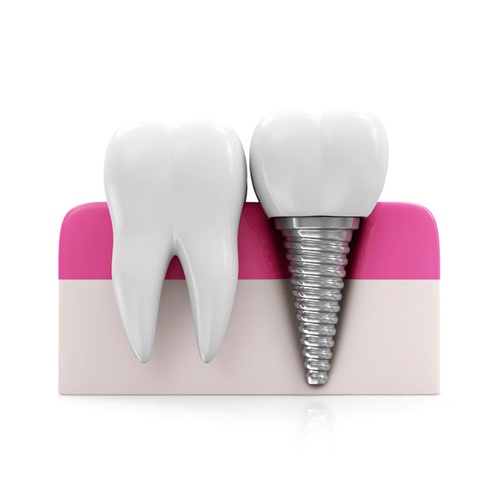Dental Implant Salvage – Huntington Beach, CA
When Your Tooth Replacement Needs Immediate Care
In 95% of cases, dental implants provide a successful solution to missing teeth, even in cases where several teeth are lost. There are rare instances where dental implants can fail, even when all precautions are taken ahead of time to avoid it. The risk remains relatively low, but Dr. Braga and his team are prepared for all scenarios. That’s why we offer solutions to address a failing dental implant. We’re also happy to break down the main causes of failure and how to recognize the symptoms early. If you believe that you have a failed dental implant in Huntington Beach, don’t hesitate to give our office a call!
Why Do Dental Implants Fail?

One of the most common causes of dental implant failure is peri-implantitis, a type of infection specifically related to the tissue surrounding the implant. When infected, it can compromise the implant’s stability and cause it to loosen and even fall out. Over time, the infection causes the jawbone tissue and gums to break down, making the implant susceptible to micro motions. The main cause of this infection is poor oral hygiene, but other causes are also possible.
For example, potential causes for dental implant failure include:
- Unsuccessful osseointegration (or fusing of implant and jawbone)
- Sudden blunt force trauma
- Medical conditions that negatively impact the body’s ability to heal and support dental implants, such as cancer or diabetes
Symptoms of Failed Dental Implants

Dental implant failure can occur soon after the implants are placed or years after they have already proven to be functional, even years after osseointegration is complete.
The most common symptoms for dental implant failure include the following:
- Severe or an unsettling level of discomfort: While soreness after surgery is normal, your implants should start to feel better, not worse.
- Loose implant: While this could be the restoration that sits on top of the implant, it could also be a sign of a failing implant and should be examined immediately.
- Bleeding, swelling, and pus development: While bleeding and mild swelling is normal the day of surgery, it shouldn’t be happening for days at a time. This along with pus development is a sign that an infection has developed.
- Increase difficulty chewing: Once your restorations are attached, chewing food should be a relatively easy process. If you struggle to chew even after this phase, call our office.
How Dental Implant Salvage Works

In the event you feel something is not quite right with your dental implant, we encourage you to call our office as soon as possible. When you arrive, we’ll examine your implant, take detailed notes of your symptoms, and discuss potential treatment options to address implant failure and salvage your tooth replacement. While this could include services like deep cleanings and antibiotics, it may also include options like bone grafting, which can actually save your tooth.
What’s most important is that you call our office the moment you feel concerned. The sooner you get in touch, the more likely we will be able to help you and complete the least expensive dental care possible. When damage is minor, we may be able to either save the implant or replace it with a new one.
